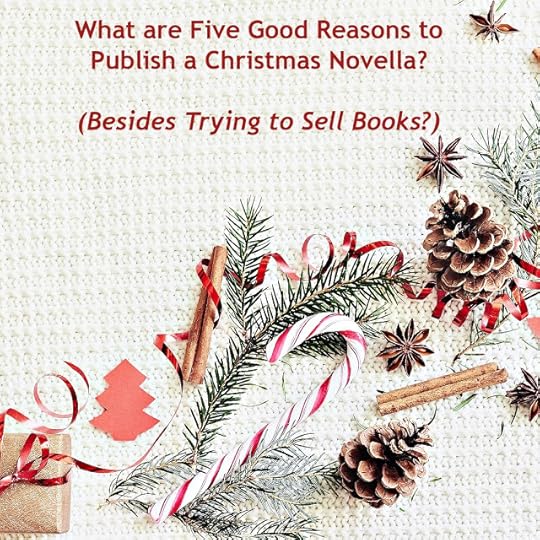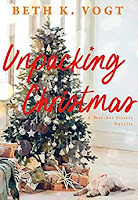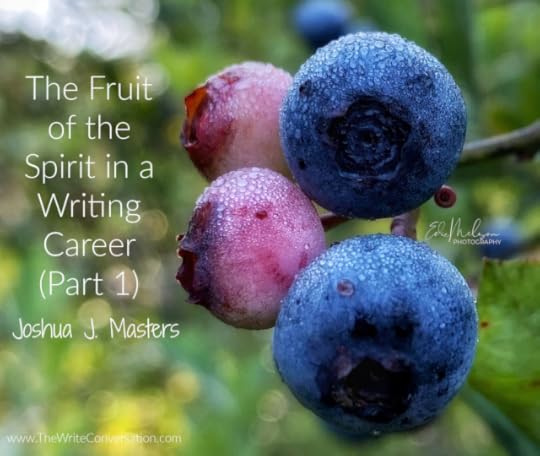Edie Melson's Blog, page 148
October 12, 2021
COLLABORATION: TIPS FOR WRITING WITH SOMEONE ELSE—PUBLISHING AS A SECOND LANGUAGE, PART 2

by Linda Gilden @LindaGilden
There are many wonderful reasons and methods for co-authoring a book. Here are just a few of them.
1. You have someone to share the work with. Even though it may not end up being exactly a 50/50 split, you have someone to bounce ideas off of, discuss important points, and plan not only the book but also the book launch and marketing method. In most of these cases two heads are better than one! My latest co-authored series is the LINKED Personality Series written with Linda Goldfarb. We quickly learned that because we are both very busy people, deadlines could sneak up on us and if we weren’t careful, we’d end up behind our self-imposed schedule. When that happened, one of us listened to what all the other had going on and always replied, “Let me handle that. I think I can make that work.” Flexibility is very important when trying to combine two different schedules.
2. It is important to have a co-authoring agreement that works for both parties. For instance, some co-authored teams divide up the number of chapters and each person writes half. Others take a look at the subject of each chapter and the person most knowledgeable on that subject writes that chapter. If you are writing devotions or short pieces, you may want to divide them more randomly so that your writing styles are interspersed.
Interestingly, one of my first co-authored books was Mommy Pick-Me-Ups. Edna Ellison and I shared the writing of this devotion book for young moms. The first several interviews we did on this book, the host of the interview looked at me and said something like, “The story on page 66 about the monkey was really interesting to me. Tell us about that one.” Well, it just so happened that Edna had written that one. I knew there was a monkey story in the book but as far as being able to recall it in detail, it just wasn’t going to happen.
So instead of looking at the host with a blank stare, I said, “You are right. That is a great story. But my favorite story in the book is the story about my son’s hands. May I share that one and tell you why I love it so much!”
3. You will be so blessed to work that closely with someone else who shares your passion for the subject of your book. When that occurs, you will become each other’s biggest cheerleaders in the project, and let’s face it, we all need a good cheerleader. You can encourager each other when you are struggling to find the right word and rejoice together when you find it!
4. When it comes to marketing you have someone to share the work with. That is extremely beneficial when you and your co-author live in different parts of the country.
5. Working so closely with someone allows you to deepen your friendship and become close friends for life!
TWEETABLECollaboration: Tips for Writing with Someone Else—Publishing as a Second Language from @LindaGilden on @EdieMelson (Click to Tweet)
Don't miss the other posts in this series!Collaboration: Tips for Writing with Someone Else - Part 1Collaboration: Tips for Writing with Someone Else - Part 2
 Linda Gilden has coauthored 11 books with 5 different coauthors and has #12 and #13 coming out in 2022, adding a new co-author to the list. She loves every one of her coauthors and enjoys collaborating on interesting projects with them. She also has written many books on her own and realizes what a treasure and blessing a good co-author is.
Linda Gilden has coauthored 11 books with 5 different coauthors and has #12 and #13 coming out in 2022, adding a new co-author to the list. She loves every one of her coauthors and enjoys collaborating on interesting projects with them. She also has written many books on her own and realizes what a treasure and blessing a good co-author is.
Published on October 12, 2021 22:00
October 11, 2021
How to Prepare Your Writing Life for the Unexpected

by Cindy K. Sproles @CindyDevoted
There isn’t a person I know who can say that 2020, and truthfully 2021, hasn’t affected them. We haven’t seen such chaos and internal unrest since the 1960s. I remember as a child, being afraid to close my eyes to sleep and wondering if the world would end. Now, here we stand again, amid that same type of unrest and fear. Between Covid-19, its variants, and the civil dissatisfaction, I feel like I’m four years old again, reliving those same fears. In my 60s, I would lie if I didn’t say the angst keeps me up at night.
Though this last year, I’ve experienced loss. Of course, I’m not the only one, but it seems to be more loss than the average Joe runs sees. This past year Covid has claimed two of my sweetest writing friends, and cancer has taken another. My heart hardly had time to recover before the next death hit. It has become increasingly vital to address our writing careers from the backside going forward rather than the opposite.
Just as we pre-arrange our final wishes for when we enter our eternal home, likewise, we need to prepare our writing careers. The loss of three well-established writing friends brought this reality to the forefront. Two had significant three-book contracts, while the third had a manuscript in editing due to the publisher. When death strikes, our writing career is the least important thing on our minds, but in the coming weeks, things will immerge that demand sometimes clueless families must handle.
Take time now to make arrangements for your writing work.
Here are a few necessities to help you prepare your writing life.
Organize your work: I can’t stress enough the importance of this. Make one primary file on your desktop that houses individual project files. Title it something obvious, like WRITING WORK. Inside this file, make individual files for each work you have. Don’t lump work together. Keep each project separate. The exception would be blog posts which are fine, stored in one file. On my computer, I have files listed like this:WRITING PROJECTSUnder this, there are individual filesBlog PostsNovelsIndividual Novels ( Mercy’s Rain, Liar’s Winter, What Momma Left Behind, This is Where it Ends)Current Contracted Novels (Houses individual stories that are under construction for contract fulfillmentMentoring WorkSpreadsheet listing all work and the status, money receivedIndividual client filesPublisher Editing, WRAMS, Private ClientsConference WorkACWCCurrent Year Conference TravelConference PowerPointsConference ClassesHaving one file housing all your work makes location easy. There is no searching for your family or agent. Everything is fully labeled and accessible. How you label them is up to you but remember, your executor needs to understand how you’ve tagged them. Remember, simple is best.
Purchase quality off-site storage: There are tons of ways to store your work, but it is a proven fact that your files need to be stored off-site or away from your home. If you are new to the writing world, using a removable hard drive would work for a time, but once you start selling work, your files need to be stored away from home with a reputable company becomes a must. If you experience a computer failure or a home disaster (i.e., fire, storm, etc.), your files are safely stored off-premise and can be easily retrieved and restored. There is nothing worse than lost work. Trust me, been there, done it. It is not fun. Companies like Bask, DropBox, even iCloud provide off-site storage that keeps your files safe. Remember, these services are paid monthly or yearly, and if the bill is not paid, the work vanishes. Be sure you have that person who can step in and access your files and that they can maintain or download and secure your work.
File box for contracts and royalty reports: Heaven forbid should the worse happen, but a physical file box is a must. Keep copies of your book contracts, a notebook with outstanding private work, i.e., mentoring or editing) and all your royalty statements. This box should also contain a file with your agent information listed and your agency contract. Make a quick reference card with your agent name, address, phone number, and email so your executor can easily access them. Add a list of individuals who might be able to pick up your work on private editing or mentoring, and be sure unfinished work is completed, especially if you have paying clients who are owed work. This preparation applies to your accounting and access to your writing bank account as well.
Agent access: Your agent will have copies of your contracts set up through their agency, but giving them access to your off-site storage can be very helpful. If it becomes necessary to access these files, your agent can quickly locate, download, and complete contract fulfillments. Should something happen to you, the next most important person to get this information is your agent. Agents are able then to complete, cancel, or see-through, open contractual obligations. FYI, having a writing peer who knows your style as well can be helpful for an agent, should a work in progress need to be completed rather than canceled. Remember, there are details that agents must handle, like details with advances, ongoing royalty payments, etc. Talk with your agent so they know your feelings and what to do in the event of something catastrophic happening.
No one likes to think about end-of-life decisions, but the truth is, it’s a necessity. Be responsible to your family, agent, clients, and publishers. Take time to make these simple files. It is a kind thing to do.
TWEETABLEHow to Prepare Your Writing Life for the Unexpected from @CindyDevoted on @EdieMelson (Click to Tweet)
 Cindy K. Sproles is an author, speaker, and conference teacher. She is the cofounder of Christian Devotions Ministries and the executive editor for christiandevotions.usand inspireafire.com. Cindy is the lead managing editor for SonRise Devotionals and also Straight Street Books, both imprints of LPC/Iron Stream Media Publications. She is a mentor with Write Right and the director of the Asheville Christian Writers Conference held each February at the Billy Graham Training Center, the Cove, Asheville, NC. Cindy is a best selling, award winning novelist. Visit Cindy at www.cindysproles.com.
Cindy K. Sproles is an author, speaker, and conference teacher. She is the cofounder of Christian Devotions Ministries and the executive editor for christiandevotions.usand inspireafire.com. Cindy is the lead managing editor for SonRise Devotionals and also Straight Street Books, both imprints of LPC/Iron Stream Media Publications. She is a mentor with Write Right and the director of the Asheville Christian Writers Conference held each February at the Billy Graham Training Center, the Cove, Asheville, NC. Cindy is a best selling, award winning novelist. Visit Cindy at www.cindysproles.com.
Published on October 11, 2021 22:00
October 10, 2021
Speaking Tips for Writers: Meet Ellie Kay

by Yvonne Ortega @YvonneOrtega1
Who Is Ellie Kay?
Ellie Kay is an international speaker in both the general and faith-based markets. She is also the author of fifteen best-selling books and is known for her presentation, Heroes at Home. She has given that presentation to all branches of the military in the Unites States, Europe, and Asia.
Ellie can offer countless speaking tips for writers. Let’s look at three of them.
Be Inspired to Research
Ellie Kay began her speaking career after she spoke about a coupon seminar on local TV news. After the news, she pitched the idea of a weekly savings spot, and the producer agreed.
The first time, she admits she “totally bombed” because of her lack of knowledge of speaking in “sound bites” (short clips of speech to exemplify or summarize the speaker’s view). With only a four-minute segment, she never got to her first tip.
Not one to give up, Ellie was inspired to research, learn, and practice more than once before her next segment. After that, she “nailed it” every week for a year on her fifty+ segments.
Learn from the Best You Can
After more than 2,000 paid speaking events, Ellie continues to receive post-event debriefs from her Money Millhouse Podcast cohost, Bethany Bayless.
Kay’s advice is to obtain your primary feedback from a person familiar with what you do.
She also recommends that you learn from someone in your speaking expertise who is better than you are.
This reminds me of what I tell my clients: “If you practice the wrong way, it does you no good.
Hire the best you can afford and have a written contract.”
Be Teachable
Ellie Kay encourages speakers to be teachable and listen to experienced speakers who have your best interests in mind.
When Ellie became an “Accredited Speaker” in Toastmasters, she had spoken for thirty-eight years.
I sat in the audience at that competition before an international audience. Ellie captured the audience from the first moment and held their interest to the last second. Judges sat in different places in the audience and took notes.
She received a standing ovation and was the only one to become an Accredited Speaker that year. Kay worked hard to earn the elite Toastmasters International Accredited Speaker designation.
Ellie Kay lives in Palmdale, California with her husband Bob. You can learn more about her at https://elliekay.com/
To wrap up, be inspired to research, learn from the best you can, and be teachable.
TWEETABLESpeaking Tips for Writers: Meet Ellie Kay via @YvonneOrtega1 on @EdieMelson (Click to Tweet)
 Yvonne Ortega walks with a small footprint but leaves a giant imprint in people’s lives. This power-packed package is a professional speaker and the author of the Moving from Broken to Beautiful® Series through cancer, divorce, forgiveness, and loss. Learn more at WWW.YVONNEORTEGA.COM
Yvonne Ortega walks with a small footprint but leaves a giant imprint in people’s lives. This power-packed package is a professional speaker and the author of the Moving from Broken to Beautiful® Series through cancer, divorce, forgiveness, and loss. Learn more at WWW.YVONNEORTEGA.COMYvonne speaks with honesty and humor as she shares her life and struggles through presentations that empower women to find peace, power, and purpose through God’s Word.
Yvonne’s background as a licensed professional counselor brings a unique perspective into the heart of women. She’s a speaking and writing coach and the owner of Moving from Broken to Beautiful®, LLC. She belongs to the Advanced Writers and Speakers Association, the Christian Authors Network, the National Speakers Association, and Toastmasters International.
She celebrates life at the beach, where she walks, builds sand castles, blows bubbles, and dances.
Published on October 10, 2021 22:00
October 9, 2021
Looking for Something Better

by Martin Wiles @LinesFromGod
They needed something else…something better…and quickly.
One year had passed since my daughter, our son-in-law, and their two (and now three) children had moved twelve hours away to Searcy, Arkansas. Another company had bought out our son-in-law’s employer, and our son-in-law had signed a two-year contract to keep from losing his job. A part of the deal entailed the real possibility of being transferred to Arkansas. And he was.
Not knowing whether they would stay in Arkansas after two years, they decided to rent instead of buy. But after one year, the landlord hiked their rent by several hundred dollars per month. The rent was already steep, and they didn’t plan to pay any more.
With a lease about to expire, they set out to find a house. Within a brief time, they had secured one and signed the loan papers. They were homeowners with a house in better shape than the one they had rented and something they could one day call their own—and something with equity if they decided to sell one day and move back to their hometown (which we hope for).
Although their new home was in good shape and in a good neighborhood, they wanted to put their personal touches on a few things. The sitting room had a popcorn ceiling. Some of the popcorn had fallen off, so they decided to remove it all. They followed that by painting the entire room. Then, they decided to pull up the carpet on the grandboys’ side of the house and replace it with laminate flooring.
I’m not sure what they’ll do next, but I imagine they (or my daughter) will think of something to make the house better than it is.
Paul considered himself an adopted child of God…and he was and had been since he met Jesus on the Damascus Road. He wasn’t perfect, but he knew one day he would attain perfection in his attitude, words, and actions. He longed for something better…a better day.
“We, too, wait with eager hope for the day when God will give us our full rights as his adopted children, including the new bodies he has promised us” (Romans 8:23 NLT).
We often long for better things: more play toys, a new relationship, a better job, a nicer home, a different vehicle, an altered body, a different diet, a better life, a higher income. Our world offers an endless list. And nothing is wrong with many of the better things we want. Neither is anything wrong with wanting to better ourselves. Unless…
When the things we think will better us steal our focus and time from God, then they are worse, not better. The better time Paul longed for would bring him closer to the Lord, not take him farther away.
Our definition of better often differs from God’s. If the thing we consider “better” draws us closer to Him, molds us more in His image, and is something we can use to further His kingdom's work, then it’s better. Otherwise, it may only become a distraction.
The “better” in life is anything that helps us fulfill God’s plan for our lives. Let’s make sure our definition of “better” is the same as God’s?
TWEETABLELooking for Something Better, encouragement from Martin Wiles @LinesFromGod on @EdieMelson (Click to Tweet)
 Martin Wiles is the founder of Love Lines from God (www.lovelinesfromgod.com) and serves as Managing Editor for Christian Devotions, Senior Editor for Inspire a Fire, and Proof Editor for Courier Publishing. He has authored six books and has been published in numerous publications. His most recent book, A Whisper in the Woods: Quiet Escapes in a Busy World, released in December 2019. He is a freelance editor, English teacher, author, and pastor.
Martin Wiles is the founder of Love Lines from God (www.lovelinesfromgod.com) and serves as Managing Editor for Christian Devotions, Senior Editor for Inspire a Fire, and Proof Editor for Courier Publishing. He has authored six books and has been published in numerous publications. His most recent book, A Whisper in the Woods: Quiet Escapes in a Busy World, released in December 2019. He is a freelance editor, English teacher, author, and pastor.
Published on October 09, 2021 22:00
October 8, 2021
What are Five Good Reasons to Publish a Christmas Novella? (Besides Trying to Sell Books?)
Edie here. I hope you'll celebrate with our own Beth Vogt as she gets ready to release her Christmas novella:
Unpacking Christmas
! I asked her to share her thoughts on releasing a novella and specifically one at Christmas. I know you'll be blessed & encouraged by her insight!

by Beth K. Vogt @BethVogt
My book, Unpacking Christmas: A Thatcher Sisters Christmas Novella , is up for preorder on Amazon. So many writer friends are celebrating with me, telling me they hope I have great sales.
I say, “Thank you,” and then tell them I don’t care about the sales. Honestly, yes, that’s what I’ve said.
And now, I’ll explain my response.
Of course, I hope Unpacking Christmas sells well. What author doesn’t want good sales numbers for their book? But, despite all the marketing we do and all the marketing our publishers do, we can’t control numbers.
However, there are other concrete goals I can celebrate because I wrote an published this novella. I want to ensure these achievements don’t get lost in the focus on sales.
This year, I wanted to:Be creative again in 2021 after going through a dry period in 2020. Anybody else experience a loss of inspiration during the onslaught of COVID? Writing Unpacking Christmas was the project that helped me jumpstart my creativity this past year.Write a Christmas novella. Readers love Christmas novellas. They’re fa-la-la-la-fun. Lighthearted. But they’re also hope-filled and easily wrapped around a romance. Unpacking Christmas is my first Christmas novella—and I already have an idea for another one. Revisit my Thatcher Sister Series. Readers asked if I was going to write any more books in this series since the release of book 3, The Best We’ve Been, in May 2020. I’d said no, but a Christmas novella seemed like a perfect opportunity to drop in on my characters.Be a hybrid author. I can now say I’m both traditionally and self-published. I don’t know if I’ll do this again, but I took copious notes on the process … and kept a couple of friends on speed-dial.Support other authors. As I promote Unpacking Christmas, I’m also celebrating other author-friends who’ve released Christmas novellas or novels this year. And I can shout out friends like Rachel Hauck and Lindsay Harrel whose self-publishing savvy helped me time and time again when I bombarded them with “what do I do know?” questions.What about you? What writing goals—besides producing good sales numbers—have you achieved this year?
TWEETABLEWhat are Five Good Reasons to Publish a Christmas Novella? (Besides Trying to Sell Books?) from @BethVogt on @EdieMelson (Click to Tweet)

Unpacking Christmas: A Thatcher Sisters Christmas Novella Beth K. Vogt
This Christmas, Johanna, Jillian, and Payton will realize the true magic of Christmas isn’t found in gifts or decorations, but in the love of family.
 Beth K. Vogt believes God’s best often waits behind the doors marked “Never.” Having authored nine contemporary romance novels and novellas, The Best We’ve Been, the final book in Beth’s Thatcher Sisters Series with Tyndale House Publishers, releasers May 2020. Other books in the women’s fiction series include Things I Never Told You, which won the 2019 AWSA Award for Contemporary Novel of the Year, and Moments We Forget. Beth is a 2016 Christy Award winner, a 2016 ACFW Carol Award winner, and a 2015 RITA® finalist. An established magazine writer and former editor of the leadership magazine for MOPS International, Beth blogs for Learn How to Write a Novel and The Write Conversation and also enjoys speaking to writers group and mentoring other writers. Visit Beth at bethvogt.com.
Beth K. Vogt believes God’s best often waits behind the doors marked “Never.” Having authored nine contemporary romance novels and novellas, The Best We’ve Been, the final book in Beth’s Thatcher Sisters Series with Tyndale House Publishers, releasers May 2020. Other books in the women’s fiction series include Things I Never Told You, which won the 2019 AWSA Award for Contemporary Novel of the Year, and Moments We Forget. Beth is a 2016 Christy Award winner, a 2016 ACFW Carol Award winner, and a 2015 RITA® finalist. An established magazine writer and former editor of the leadership magazine for MOPS International, Beth blogs for Learn How to Write a Novel and The Write Conversation and also enjoys speaking to writers group and mentoring other writers. Visit Beth at bethvogt.com.

by Beth K. Vogt @BethVogt
My book, Unpacking Christmas: A Thatcher Sisters Christmas Novella , is up for preorder on Amazon. So many writer friends are celebrating with me, telling me they hope I have great sales.
I say, “Thank you,” and then tell them I don’t care about the sales. Honestly, yes, that’s what I’ve said.
And now, I’ll explain my response.
Of course, I hope Unpacking Christmas sells well. What author doesn’t want good sales numbers for their book? But, despite all the marketing we do and all the marketing our publishers do, we can’t control numbers.
However, there are other concrete goals I can celebrate because I wrote an published this novella. I want to ensure these achievements don’t get lost in the focus on sales.
This year, I wanted to:Be creative again in 2021 after going through a dry period in 2020. Anybody else experience a loss of inspiration during the onslaught of COVID? Writing Unpacking Christmas was the project that helped me jumpstart my creativity this past year.Write a Christmas novella. Readers love Christmas novellas. They’re fa-la-la-la-fun. Lighthearted. But they’re also hope-filled and easily wrapped around a romance. Unpacking Christmas is my first Christmas novella—and I already have an idea for another one. Revisit my Thatcher Sister Series. Readers asked if I was going to write any more books in this series since the release of book 3, The Best We’ve Been, in May 2020. I’d said no, but a Christmas novella seemed like a perfect opportunity to drop in on my characters.Be a hybrid author. I can now say I’m both traditionally and self-published. I don’t know if I’ll do this again, but I took copious notes on the process … and kept a couple of friends on speed-dial.Support other authors. As I promote Unpacking Christmas, I’m also celebrating other author-friends who’ve released Christmas novellas or novels this year. And I can shout out friends like Rachel Hauck and Lindsay Harrel whose self-publishing savvy helped me time and time again when I bombarded them with “what do I do know?” questions.What about you? What writing goals—besides producing good sales numbers—have you achieved this year?
TWEETABLEWhat are Five Good Reasons to Publish a Christmas Novella? (Besides Trying to Sell Books?) from @BethVogt on @EdieMelson (Click to Tweet)

Unpacking Christmas: A Thatcher Sisters Christmas Novella Beth K. Vogt
This Christmas, Johanna, Jillian, and Payton will realize the true magic of Christmas isn’t found in gifts or decorations, but in the love of family.
 Beth K. Vogt believes God’s best often waits behind the doors marked “Never.” Having authored nine contemporary romance novels and novellas, The Best We’ve Been, the final book in Beth’s Thatcher Sisters Series with Tyndale House Publishers, releasers May 2020. Other books in the women’s fiction series include Things I Never Told You, which won the 2019 AWSA Award for Contemporary Novel of the Year, and Moments We Forget. Beth is a 2016 Christy Award winner, a 2016 ACFW Carol Award winner, and a 2015 RITA® finalist. An established magazine writer and former editor of the leadership magazine for MOPS International, Beth blogs for Learn How to Write a Novel and The Write Conversation and also enjoys speaking to writers group and mentoring other writers. Visit Beth at bethvogt.com.
Beth K. Vogt believes God’s best often waits behind the doors marked “Never.” Having authored nine contemporary romance novels and novellas, The Best We’ve Been, the final book in Beth’s Thatcher Sisters Series with Tyndale House Publishers, releasers May 2020. Other books in the women’s fiction series include Things I Never Told You, which won the 2019 AWSA Award for Contemporary Novel of the Year, and Moments We Forget. Beth is a 2016 Christy Award winner, a 2016 ACFW Carol Award winner, and a 2015 RITA® finalist. An established magazine writer and former editor of the leadership magazine for MOPS International, Beth blogs for Learn How to Write a Novel and The Write Conversation and also enjoys speaking to writers group and mentoring other writers. Visit Beth at bethvogt.com.
Published on October 08, 2021 22:00
October 7, 2021
The Fruit of the Spirit in a Writing Career (Part 1)

by Joshua J. Masters @JoshuaJMasters
When we think of a fruitful writing career, we usually weigh our success with the number of books we’ve published, how many articles we’ve had printed, or the quantity of paperbacks we’ve sold. But for Christian writers, the development of our character should be of greater concern than the success of our career as an author. But developing Christian character is the greatest thing we can do for our writing.
In the book of Galatians, God describes the fruit we should see in our lives when we live in the power and direction of the Holy Spirit:
… the Holy Spirit produces this kind of fruit in our lives: love, joy, peace, patience, kindness, goodness, faithfulness, gentleness, and self-control. There is no law against these things! (Galatians 5:22-23 NLT)
HERE IS THE QUESTION FOR CHRISTIAN WRITERS:
If God has called me to write—if His purpose in creating me is crafting words to glorify His name, then should I not experience the Fruit of the Spirit in my writing career?
The hard truth is, the closer I am in my relationship with God, the more I should experience love, joy, peace, patience, kindness, gentleness, and self-control in my writing experience. But the more I turn my writing into an idol to be worshipped rather than a way to connect with God, the less fruit I will see in my life, career, and craft.
So, how should these nine traits reveal themselves in my writing? We’ll look at the first four today and the rest in next month’s column.
LOVEWhen religious leaders asked Jesus what the greatest commandment was (see Mark 12:28-31), His answer was love—loving God with all that you are and loving others. And while that’s a paraphrase, His message was simple. Love should be the hallmark attribute of a Christ follower.
One of the quotes that inspires my writing has nothing to do with writing—it’s about running. In the movie based on the life of 1924 Olympian Eric Liddell, Chariots of Fire, Eric says, “I believe God made me for a purpose, but He also made me fast. And when I run, I feel His pleasure.”
Liddell’s gift was relational. He was more connected to the source of his talent than the talent itself.
Do you feel God’s pleasure when you write? Does writing give you a greater love for God, reveal His love for you, and fill you with compassionate love for your readers? If not, spend time with God and rekindle that connection. God created you for a purpose and He wants you to experience His love when you’re walking in that purpose.
JOYDo we find joy in our writing, or do we drag ourselves to the keyboard with dread? I’ve seen well-meaning Christians post memes that say, “Choose Joy,” but that’s nearly impossible. That’s because joy isn’t an emotion; it’s a state of being. We can’t rely on ourselves to summon a particular emotion in every trial, but we can learn to live in joy of Christ despite our circumstances.
Too often we chase an emotion rather than surrendering to the joy of the Spirit. If we’re honest, that’s a control issue. We’d rather roll the weighted dice of our emotions than trust Christ with the outcome of our efforts. But it’s living in the release of that control that allows us to experience the freedom of joy, knowing God is directing all things for our spiritual growth and ultimate good (see Romans 8:28).
PEACEIt’s difficult to feel peaceful when you’re waiting to hear from an agent reviewing your book proposal, isn’t it? Peace isn’t our natural response to the unknown, but the writing industry is filled with uncertainty. In fact, the only thing guaranteed in a writing career is rejection. So, without the Fruit of the Spirit, we can easily devolve into a daily routine of self-doubt and anxiety.
Peace is another sign of how healthy our relationship with Christ has become. As we grow in His love and joy, we learn to experience peace—even when that rejection email comes. That doesn’t mean we’re never disappointed, but it does mean those disappointments no longer affect our identity.
When describing suffering far greater than an unpublished manuscript, Jesus said, “I have told you these things, so that in me you may have peace. In this world you will have trouble. But take heart! I have overcome the world” (John 16:33 NIV). Peace comes from experiencing Christ’s victory in your life because living in His eternal triumph will overshadow daily, human defeat.
PATIENCEDo I really need to express the necessity of patience in the life of an author? I’ll admit this particular bud on the tree of spiritual growth hasn’t flourished as much as I’d like in my life, but I’m getting there.
Maybe the first act of patience we need to practice is with ourselves. God refines our relationship with Him over time and we can’t expect a perfect harvest of fruit immediately. Paul wrote, “And I am certain that God, who began the good work within you, will continue His work until it is finally finished on the day when Christ Jesus returns. (Philippians 1:6 NLT).” That means we’re looking for progress, not perfection.
It’s easy for an author’s heart to read an article like this and beat themselves up for underachieving. But nothing about that will bear greater fruit in your life. It will only poison the tree. As we evaluate the love, joy, peace, and patience God wants us to experience in our writing, it gives us the opportunity to seek a deeper connection with the One who first called us to write.
But what about kindness, goodness, faithfulness, gentleness, and self-control? Here’s another opportunity to practice patience. Look for Part 2 of this column on Friday, November 12.
TWEETABLEThe Fruit of the Spirit in a Writing Career (Part 1) from @JoshuaJMasters on @EdieMelson (Click to Tweet)
 Joshua J. Masters is a pastor, author, and speaker with a heart for encouraging others. His book on prayer, AMERICAN PSALMS, was a Serious Writer’s Book of the Decade finalist. He’s been featured on CBN Television, HIS Radio, the Light Radio Network, and worked in the film industry as a member of SAG-AFTRA performer. He is a regular teacher and speaker for large groups. A self-proclaimed sci-fi and comic book geek, Josh loves film, pop culture and is known in some circles as THE BAT PASTOR. Joshua was raised in the White Mountains of New England and now serves as a pastor in South Carolina where he lives with his wife, Gina, and their miniature poodle, FRANKLIN THE PUP, who is the subject of his latest book. Josh would love to connect with you on his website, JOSHUAJMASTERS.COM
Joshua J. Masters is a pastor, author, and speaker with a heart for encouraging others. His book on prayer, AMERICAN PSALMS, was a Serious Writer’s Book of the Decade finalist. He’s been featured on CBN Television, HIS Radio, the Light Radio Network, and worked in the film industry as a member of SAG-AFTRA performer. He is a regular teacher and speaker for large groups. A self-proclaimed sci-fi and comic book geek, Josh loves film, pop culture and is known in some circles as THE BAT PASTOR. Joshua was raised in the White Mountains of New England and now serves as a pastor in South Carolina where he lives with his wife, Gina, and their miniature poodle, FRANKLIN THE PUP, who is the subject of his latest book. Josh would love to connect with you on his website, JOSHUAJMASTERS.COM
Published on October 07, 2021 22:00
October 6, 2021
What to do When Writing Inspiration Leaves You Adrift

by Lynn H. Blackburn @LynnHBlackburn
Writing by the Ash Wind
Do you know this term? To do something by ash wind?
It’s an expression I just heard a few weeks ago. It’s an old sailing term—to sail by ash wind—and the moment I learned of it, I could see the writing application.
In case this is a new concept for you, let me explain:
Hundreds of years ago, when ships relied on the wind to power their way across the sea, the worst thing that could happen was for the ship to become becalmed. When the ship was becalmed, it was dead in the water. There was no wind. No movement. The ship would sit there, bobbing along but going nowhere.
If a ship remained becalmed, the sailors would do the only thing they could do. They would climb into a small boat that was tethered to the larger vessel, and they would row.
Can you picture it? The large ship in calm seas, the smaller boat filled with sailors, rowing their hearts out. I imagine those initial pulls on the oars were painful, and that for quite some time it would feel like they were making precisely zero progress.
Eventually, there would be some forward momentum and the ship would inch forward. It was excruciatingly slow and miserable work. But it was their only option if they wanted to ever see the shore again.
So they rowed. And their oars? They were made of ash. Hence the term, sailing by ash wind.
You can see where I’m going with this, right?
When I first started writing, the progress was quick and relatively painless. It was fun. Pure joy. I sat down and told the story in my head without a care in the world. Words flowed. Paragraphs billowed out on the page. Chapter by chapter took shape, until the manuscript was complete.
Gotta be honest with y’all. That hasn’t how it’s been lately.
Every now and then there’s a little puff of creative wind and the scenes almost write themselves. Most of the time I stare at the screen and wonder why on earth I’m even trying to do this.
You’ve probably heard the adage that the difference between an amateur writer and professional writer is that the professional didn’t quit. That doesn’t mean that the professional hangs on until their muse speaks again and then enjoys the entire process.
No. What it means is that the professional makes the conscious choice to get out of the becalmed boat, to stop waiting for a bolt of inspiration or a flash of insight, and to write by ash wind.
Yes, it means that you may have to fight for every word. It may take longer than you think it should to complete a scene. But if you keep going, you will make progress.
Over the past couple of years I’ve written a novel and a novella by ash wind. While I was in the midst of those projects, I wasn’t even sure why I kept going. When every word is work, it’s difficult to believe that there will ever be any beauty in it.
But last week, I had occasion to re-read huge chunks of that book. I have zero memory of writing most of it. There were a few passages that made me laugh, a few that made me tear up, a few that made me swoon. ;) What surprised me most is that even though I’m the one who wrote it, I couldn’t tell which scenes came easily and which scenes took me days or weeks to complete.
Because the bottom line is that whether you write by ash wind or with sails full of creativity, the end result is the same. A completed manuscript. A finished poem. A Bible study, a script, a short story that is ready to share with the world.
Most writers I know are struggling to be creative these days. If you’re feeling that way, know that you aren’t alone. But please don’t give up.
Use that imagination and grab your oars, climb into the boat, and write by ash wind until the creative breezes begin to blow.
TWEETABLEWhat to do When Writing Inspiration Leaves You Adrift? Write by the Ash Wind, encouragement from @LynnHBlackburn on @EdieMelson (Click to Tweet)
Grace and peace,

o
 Lynn H. Blackburn loves writing romantic suspense because her childhood fantasy was to become a spy, but her grown-up reality is that she's a huge chicken and would have been caught on her first mission. She prefers to live vicariously through her characters and loves putting them into all kinds of terrifying situations while she's sitting at home safe and sound in her pajamas!
Lynn H. Blackburn loves writing romantic suspense because her childhood fantasy was to become a spy, but her grown-up reality is that she's a huge chicken and would have been caught on her first mission. She prefers to live vicariously through her characters and loves putting them into all kinds of terrifying situations while she's sitting at home safe and sound in her pajamas! Lynn’s titles have won the Carol Award, the Selah Award, and the Faith, Hope, and Love Reader’s Choice Award. Her newest series kicked off in March 2021 with Unknown Threat, Book 1 in the Defend and Protect series.
She is a frequent conference speaker and has taught writers all over the country. Lynn lives in South Carolina with her true love and their three children. You can follow her real life happily ever after by signing up for her newsletter at LynnHBlackburn.com and @LynnHBlackburn on Bookbub, Facebook, Twitter, Pinterest, and Instagram.
Published on October 06, 2021 22:00
October 5, 2021
How Do the Characters We Write Speak to Us?

by Sarah Sally Hamer @SarahSallyHamer
Characters are really nothing more than ghosts in the imagination of the writer. We start with the bones (structure), add muscles and organs (also known as goals, motivation, and conflict, as well as character traits), and finally, put flesh on everything and start pumping blood and oxygen. Sounds so simple when we break it all down, right?
But what actually brings characters to life? It’s how they tell their story.
We writers have only four real ways for a character to “talk” to us:DialogBody languageActionThoughts (POV character only)Motivation is WHY a person talks or moves or thinks. We’ll talk about that next month. This one is about HOW the character expresses and what it tells the reader. Each one is directly linked to what’s going on with that character. It’s a window into what the character feels and thinks and believes.
DialogFirst is how characters actually speak. No two people in the world, even ones in the same family or in the same culture, speak exactly the same as anyone else. Nor do we speak only one way. We each have a “mad” voice, or an “excited” voice, or a “stern” voice. We use “baby talk” with our small children and pets, “love talk” with someone we care about, and “explanation talk” when we’re teaching someone. Each one is very personal to us, as part of our entire range of voices. How does your character talk? And why? There MUST be a reason why or it doesn’t matter what they say.
Body LanguageNext is body language. There are hundreds of books and classes on body language. But I really think, as I said in my blog in September, the easiest way to learn about body language is to pay attention to the people around us. How does Suzie look when she’s happy? Does the smile on her face light up the room? And how does George react to her happiness? Does he smile with her or does he fold his arms across his chest and frown? Does his body stiffen with anger? Does she notice and lose her smile?
ActionAction itself is also significant and an amazing way to open that window into what’s going on in the character’s head. Having a character MOVE according to the emotion she or he is feeling allows an interaction with the setting (Inside? Outside? On a mountain? In a dungeon?), and gives the reader context. So, does Suzie dance down the hallway, with George turning away and walking out of the room, slamming the door behind him? Does Suzie drop into a chair and reach for a tissue?
Remember, the WHY isn’t important right now—although it is in the story itself. Instead, we’re looking for the REACTIONS of the characters’ emotions.
ThoughtsLast but not least, thoughts allow the reader to actually crawl inside characters, to deeply understand what they feel. A major part of this, however, is that the rule of thumb says thoughts can only be thought by the point of view character. So, if you’re not in George’s POV, you can’t know why he’s upset about Suzie’s happiness. IF we’re in Suzie’s POV, we can read her thoughts on the page and see that she’s worried that George didn’t want her to get pregnant, so he must not want the baby. But, if she’s wrong and he’s worried about her dying in childbirth, the reader won’t know that until a) he tells her or b) we’re in his POV and he thinks it.
Which, of course, creates the opportunity for wonderful conflict!
Bottom lineThe four ways characters are able to express don’t really limit a writer. Instead, each is an amazing tool for us to deepen POV, and to make each sentence really count.
How do you use these four ways? Share a couple of sentences!
TWEETABLEHow Do the Characters We Write Speak to Us? via @SarahSallyHamer on @EdieMelson (Click to Tweet)
 Sarah (Sally) Hamer is a lover of books, a teacher of writers, and a believer in a good story. Most of all, she is eternally fascinated by people and how they 'tick'. She’s passionate about helping people tell their own stories, whether through fiction or through memoir. Writing in many genres—mystery, science fiction, fantasy, romance, medieval history, non-fiction—‚she has won awards at both local and national levels, including two Golden Heart finals.
Sarah (Sally) Hamer is a lover of books, a teacher of writers, and a believer in a good story. Most of all, she is eternally fascinated by people and how they 'tick'. She’s passionate about helping people tell their own stories, whether through fiction or through memoir. Writing in many genres—mystery, science fiction, fantasy, romance, medieval history, non-fiction—‚she has won awards at both local and national levels, including two Golden Heart finals.A teacher of memoir, beginning and advanced creative fiction writing, and screenwriting at Louisiana State University in Shreveport for almost twenty years, she also teaches online for Margie Lawson at WWW.MARGIELAWSON.COM. Sally is a free-lance editor and book coach at Touch Not the Cat Books, with many of her students and clients becoming successful, award-winning authors.
You can find her at hamerse@bellsouth.net or WWW.SALLYHAMER.BLOGSPOT.COM
From Sally: I wish to express gratitude to the giants upon whose shoulders I stand and who taught me so much about the writing craft. I would list every one, if it were only possible.
Published on October 05, 2021 22:00
October 4, 2021
Why the Stories You Write Must Have a Problem

by PeggySue Wells @PeggySueWells
To have a story is to have a problem. Story is conflict. Crisis. There must be a problem, an interruption to paradise, a discord in harmony. Without this essential ingredient, you have a description, but not a story.
One of my favorite writers experienced a traumatic life event. She naturally felt raw and vulnerable. This artist who also writes created a splendid make-believe land. At each writers meeting, we enjoyed our safe visit with the endearing residents. But before long, the listeners began to yawn. “Get a problem, Mary.”
The phrase remains a clarion call for authors.
We teach our children to be nice. Living in community, we are kind to others. When we put on our writer’s hat, we develop characters we care about. And because we care, we are tempted treat them kindly. This makes for a boring story at best. An author must consider the worst scenario and toss their beloved character head first into the exact situation we wish to protect them from.
Not:Will Stevie pass his spelling test?Will Ellie get a date to the prom?Instead:Will Steve Rogers protect America from nuclear destruction?Will Cinderella get to the ball and meet Prince Charming or perish in slavish obscurity?Readers learn about themselves as they observe your character react to worst case challenges. Our characters experience that transformative character arc because they were tested.
Former Pixar storyboard artist, Emma Coats outlined the basic story structure as a Mad Lib exercise.
Once upon a time, there was ______________________.
Every day, ____________________________________.
One day, ______________________________________.
Because of that, _________________________________.
Until finally, ____________________________________.
Fill in the blanks using your favorite stories. Now, fill in the blanks with your story ideas.
Author John Gardner explained conflict development this way. “A character wants something, goes after it despite opposition, and so arrives at a win, lose, or draw.”
Joseph Campbell described the story structure as a monomyth. “A hero ventures forth from the world of common day into a region of supernatural wonder: fabulous forces are there encountered, and a decisive victory is won: the hero comes back from this mysterious adventure with the power to bestow boons on his fellow man.”
In his book, The Hero With A Thousand Faces, Campbell outlined 17 stages of the monomyth which have been condensed into Call to AdventureInitiationReturnJerry Jenkins gives these essentials.An openerAn inciting incident that changes everythingA series of crises that build tensionA climaxAn endDan Harmon created a story circle.A character is in a zone of comfortBut they want somethingThey enter an unfamiliar situationAdapt to the situationGet what the character wantedPay a heavy price for itReturn to their familiar situationAre changed from the experienceGeorge Abbot summarized, “In the first act, you get your hero up a tree. The second act, you throw rocks at him. For the third act, you let him down.”
Or in the words of our writers group to our talented, though initially hesitant-to-put-her characters-in-danger fellow wordsmith, story is conflict. To create a story worth reading, give your character a really big problem. Big enough, that there is doubt that the character we care about can triumph.
Mary Coons did get a problem. The Piglys and the Hundred-Year Mystery features a century-old curse, a plot against Pigville, and a weapon with the potential to burn down their entire town.
TWEETABLEWhy the Stories You Write Must Have a Problem tips from @PeggySueWells on @EdieMelson (Click to Tweet)
 Tropical island votary and history buff, PeggySue Wells parasails, skydives, snorkels, scuba dives, and has taken (but not passed) pilot training. Writing from the 100-Acre wood in Indiana, Wells is the bestselling author of twenty-eight books including The Slave Across the Street, Slavery in the Land of the Free, Bonding With Your Child Through Boundaries, Homeless for the Holidays, and Chasing Sunrise. Optimistic dream-driver, PeggySue is named for the Buddy Holly song with the great drumbeat. At school author visits, she teaches students the secrets to writing, and speaks at events and conferences. Connect with her at www.PeggySueWells.com, on Facebook at PeggySue Wells, and Twitter @PeggySueWells.
Tropical island votary and history buff, PeggySue Wells parasails, skydives, snorkels, scuba dives, and has taken (but not passed) pilot training. Writing from the 100-Acre wood in Indiana, Wells is the bestselling author of twenty-eight books including The Slave Across the Street, Slavery in the Land of the Free, Bonding With Your Child Through Boundaries, Homeless for the Holidays, and Chasing Sunrise. Optimistic dream-driver, PeggySue is named for the Buddy Holly song with the great drumbeat. At school author visits, she teaches students the secrets to writing, and speaks at events and conferences. Connect with her at www.PeggySueWells.com, on Facebook at PeggySue Wells, and Twitter @PeggySueWells.
Published on October 04, 2021 22:00
October 3, 2021
5 Reasons to Join Author Street Teams

by Kristen Hogrefe Parnell @khogrefeparnell
As writers, we often fill the free space in our calendars with writing deadlines, learning opportunities, and platform work. Might I add one more item to that list? Apply to participate in another author’s street team or book launch team.
Why should you join one, aside from the pure enjoyment of being an advance reader?
Consider these reasons.
#1: Encourage another author.Recently, Joshua J. Masters encouraged us authors to view our street teams as ministry opportunities. If you missed the post, I hope you’ll go back and read more about this perspective.
The flip side is that participating readers also have a chance to minister back to the author. I would challenge street team members to focus less on “what’s in it for me” and more on “how can I encourage this author?”
If you’re an author, you know how priceless a positive review is or how just one short email from a reader can brighten your day. Street team members have several opportunities to bless an author and promote the project’s success, including:Marking the book as “want to read” on GoodreadsAdding a review to Goodreads as soon as the book appears on the siteParticipating in the cover revealSharing about the book on social media Requesting the book at your local libraryPosting reviews on Amazon and other bookseller websites on release dayYou may even be able to connect book clubs or other groups to the book, blessing the author in unexpected ways.
#2: Meet other like-minded readers.A perk of joining a launch team is getting to know and engaging with fellow team members who enjoy the same types of books you do. While some street team members will be authors, many are readers who are passionate about the author or the project.
As we authors know, networking is huge in this industry. Launch teams provide an opportunity for you to meet other likeminded readers and authors. You can then connect with them on social media and help share and like each other’s posts about the upcoming release.
You never know where these connections will lead.
#3: Promote within your genre.You might think that promoting other authors who write in your genre will detract from your own readership, but more than likely, you’ll discover the opposite is true. For example, let’s say you find a new author on Instagram and you don’t know anything about her project. However, that author has posted about several authors in her genre that you do recognize. If you enjoyed those books, you might check out the new author’s book by virtue of association.
The same is true for your writing. When you help your readers find other authors who might interest them, you also help new readers get a better feel for your own books when you share about related books. Joining a launch team is one way to help promote those authors and projects you personally endorse, and in the process, help cement your own brand.
#4: Discover ideas you might use (or not use) for your future street team.As a writer, you can learn so much from other authors and their book launch efforts. Maybe you really like the way the author conducts his book reveal. Start a file with examples that stood out to you. You’ll have to adjust your approach because every book is different, but you may discover some “templates” that will work well for you.
The opposite is also true. Maybe you’re on a street team and are starting to feel overwhelmed by long emails from the author with so many action items that you can’t keep track of them. Take note! When you organize your own street team, avoid the long emails or complicated action steps that made you feel weary. By understanding how a street team member feels, you can better organize your own team one day.
#5: Have fun!This reason is a given. Participating in launch teams gives you a chance to better connect with the author, the book, and sometimes even snag some fun book swag.
Are there any drawbacks? Aside from the time commitment, I can think of just one: If the book is the first in a planned series, you will have to wait extra-long for the sequel—unless you apply for its street team as well.
Have you participated in street teams before? What was your favorite part?
TWEETABLE5 Reasons to Join Author Street Teams from @KHogrefeParnell on @EdieMelson (Click to Tweet)
 Kristen Hogrefe Parnell writes novels, learns something new every day, and runs for pizza. An educator and mentor, she teaches English online and is an inspirational speaker for schools, churches, and podcasts. Her young adult dystopian novels, The Revisionary and The Reactionary, both won the Selah for speculative fiction, and she signed with Mountain Brook Ink for a new romantic suspense series, coming December 2022. Kristen and her husband live in Florida and enjoy sharing their lake home with family and friends. She blogs at KristenHogrefeParnell.com where she challenges readers to find faith in life’s everyday adventures.
Kristen Hogrefe Parnell writes novels, learns something new every day, and runs for pizza. An educator and mentor, she teaches English online and is an inspirational speaker for schools, churches, and podcasts. Her young adult dystopian novels, The Revisionary and The Reactionary, both won the Selah for speculative fiction, and she signed with Mountain Brook Ink for a new romantic suspense series, coming December 2022. Kristen and her husband live in Florida and enjoy sharing their lake home with family and friends. She blogs at KristenHogrefeParnell.com where she challenges readers to find faith in life’s everyday adventures.
Published on October 03, 2021 22:00



